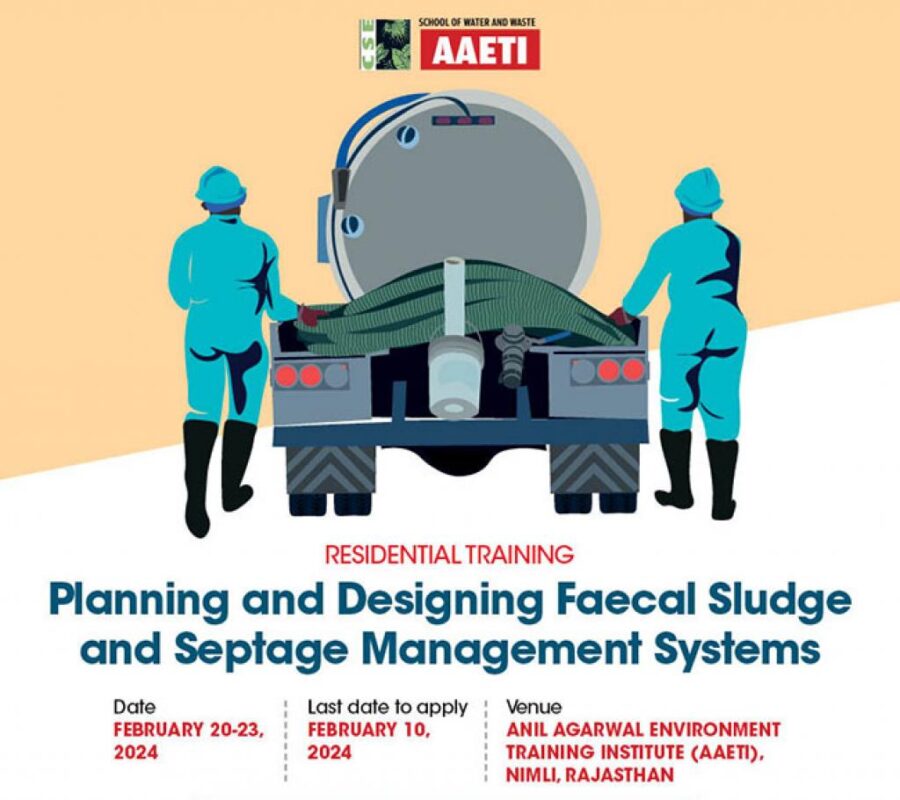Planning and Designing Faecal Sludge and Septage Management Systems: CSE

![]()
Last date to apply 10th Feb 23 / Venue: Rajasthan / Date: 20 – 23, 2024
The Centre for Science and Environment (CSE) is a public interest research and advocacy organisation based in New Delhi. CSE researches into, lobbies for and communicates the urgency of development that is both sustainable and equitable. The scenario today demands using knowledge to bring about change. In other words, working India’s democracy. This is what we aim to do.The challenge, we see, is two-pronged. On the one hand, millions live within a biomass based subsistence economy, at the margins of survival. The environment is their only natural asset. But a degraded environment means stress on land, water and forest resources for survival. It means increasing destitution and poverty. Here, opportunity to bring about change is enormous.But it will need a commitment to reform – structural reform- in the way we do business with local communities. On the other hand, rapid industrialization is throwing up new problems: growing toxification and a costly disease burden. The answers will be in reinventing the growth model of the Western world for ourselves, so that we can leapfrog technology choices and find new ways of building wealth that will not cost us the earth. Our aim is to raise these concerns, participate in seeking answers and in pushing for answers, transforming these into policy and so practice. We do this through our research and by communicating our understanding through our publications. We call this knowledge-based activism. We hope we will make a difference.
Training Fees
For Indian participants:
Rs 25,600 (for double occupancy accommodation)
Rs 28,000 (for single occupancy accommodation)
For international participants:
US $590 (for double occupancy accommodation)
US $760 (for single occupancy accommodation)
Special offers
50% off for college students and registered NGOs
25% off for industry consultants, and professionals
Note: No training fee will be charged for nominated government officials.They only need to make their transportation arrangement to and fromthe CSE Head Office, New Delhi.
Who can benefit from this training?
- Engineers, planners and other technical officials from municipalities and development authorities
- Working professionals and decision makers from government and non-government institutions
- PMUs assisting the government in mainstreaming wastewater/septage measures
- Individual practitioners/consultants working in the water and sanitation sector
- Independent researchers and academia working in water and sanitation sector
Since the launch of the Swachh Bharat Mission in 2014 and the subsequent implementation of the National Policy on Faecal Sludge and Septage Management (FSSM) in 2017, significant progress has been made in Faecal Sludge Management (FSM) in various states in India. This has led to the establishment and operation of over 800 Faecal Sludge Treatment Plants (FSTPs) throughout the country.
However, on-ground studies conducted by Centre for Science and Environment (CSE) in Maharashtra, Telangana and Chhattisgarh (where FSM has been scaled up since 2017), andCSE’s experience of working in Uttar Pradesh suggest that besides design faults in some cases, even operational FSTPs are facing challenges ranging from irregular and inadequate de-sludging to poor operations and maintenance, resulting in under-utilisation of the full capacity of an FSTP.
To address this gap, it is crucial to enhance expertise in the planning and design of treatment systems. CSE is organising a four-day trainingprogramme on the subject, with the aim of equipping practitioners and government officials with:
- A core understanding of city sanitation systems and their planning
- How to plan FSM systems for small and medium towns
- How to design FSTPs and co-treatment infrastructure
Learning objectives
- Developing an understanding of onsite and offsite sanitation systems
- Developing an understanding of the tools and approaches used for FSM planning and designing with an emphasis on mapping of excreta flow in a region by using shit flow diagrams (SFDs)
- How to undertake quantification of faecalsludge and/or septagethrough various estimation methods, as required in ensuring regular de-sludging, with minimal cost implications for an ULB
- Developing an understanding of treatment technologiesfor FSM
- Developing an understandingof institutional, policy and regulatory frameworks in FSSM
- Knowing about on-ground experiences of FSSM through successful case studies
Training methodology
The training style is based on the ‘Harvard Case Method’, which conveys teaching messages through interactive sessions and practical work done by trainers/trainees. The training will be focused on experiential learning – including individual/group interaction, practical group exercises, interaction with experts, discussions, field visit and documentary films to highlight the best management practices successfully implemented. Furthermore, the training is complimented by sessions and discussions on existing case studies which demonstrate the recommended actions and interventions for sustainable sanitation management.
For more information kindly contact –
Training Coordinator
Anurag Naidu
Programme Officer- Urban Water & Waste Management
Centre for Science and Environment, New Delhi, India
Mob. +91 7276497968
Email:anurag.naidu@cseindia.org
Click here to know more and APPLY

